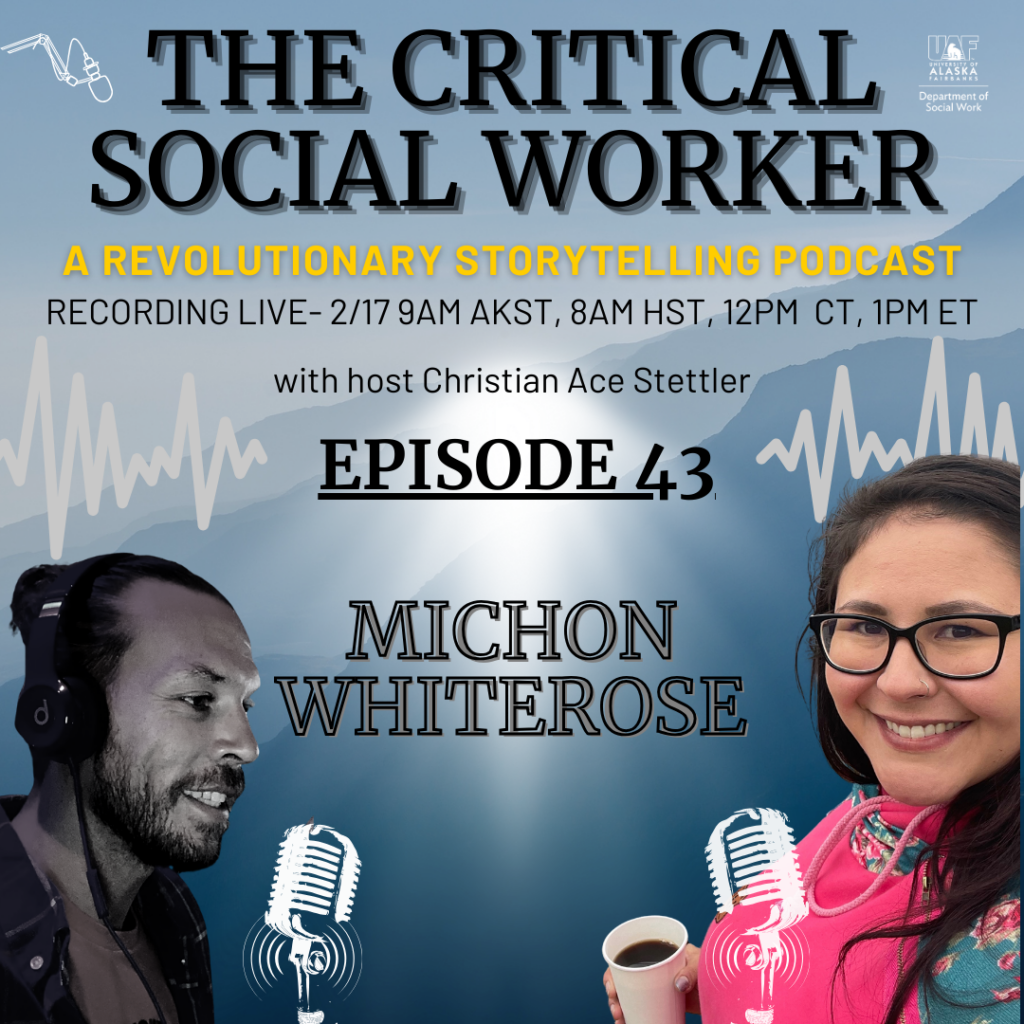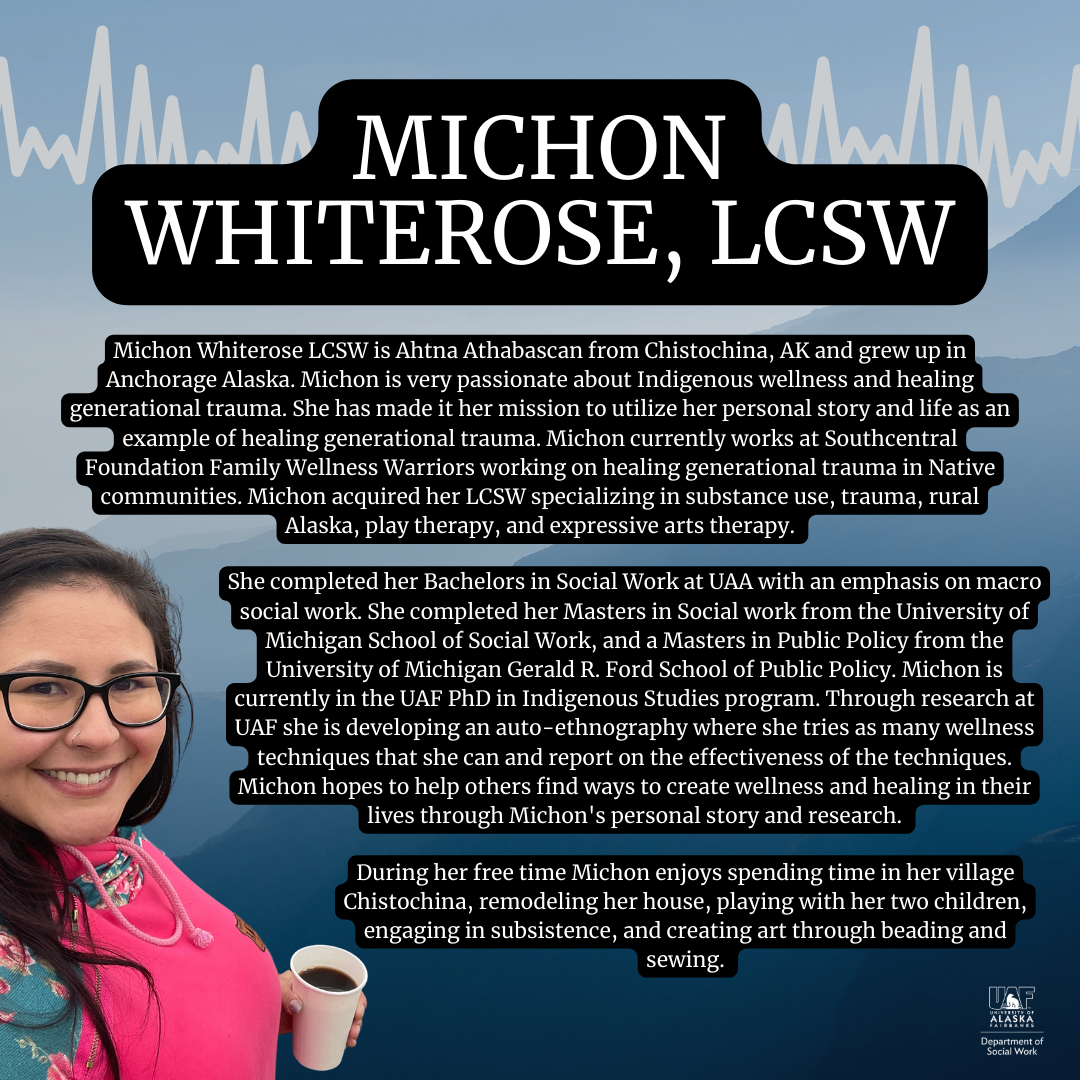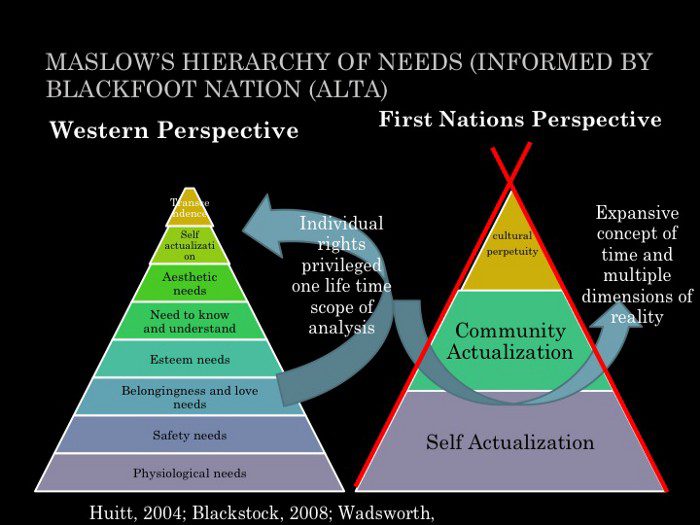
Michon Whiterose
The Critical Social Worker: A Revolutionary Storytelling Podcast
Episode 43: 2/17/2023
Host: Prof. Stettler
To better see Michon’s bio, please click on the bio image below to zoom in.


The Critical Social Worker, a revolutionary storytelling podcast, hosted by Professor Christian Stettler, is a Conscious Party production made possible by the University of Alaska Fairbanks Social Work Department.
Fueling Her Fire…
The theme of healing was very strong in this podcast. In reflecting on her life, Michon speaks about her younger self with compassion and forgiveness. In her five minute digital “oral narrative”, dedicated to her daughter (that starts at 12min50sec), Michon beautifully paints a story that takes you through her childhood pain, into her adolescent and young adult struggles, and through her own personal healing. Michon never directly discloses any details about what hurt her so much when she was young but we do hear her take responsibility for what she is doing with that hurt now. It is easy to feel Michon’s memories of the pain in how loving she is to herself and her journey when she says things like, “a very good skill my childhood failed to teach me was self-worth”. The amount of emotional intelligence that exists within that sentence is powerful, it is very clear that she has done a lot of “work” on herself. By looking at herself, and her life, through a lens of recognizing everything she is capable of, Michon has been able to avoid living a life defined by her pain and mistakes, and has instead used everything she has been through to fuel herself and her passions. In a podcast with the subtitle of, A Dialogue on Healing, I think Michon and Professor Stettler nailed it.
“I could fall in love with a demon and I wouldn’t even know it”
Michon spoke the above quote in regards to how vulnerable she was, and how easily she would fall into unhealthy relationships with people who just took more and more from her. Even though that statement says a lot, the very next sentence in her video to her daughter says so much more; “so when you came along, an entirely new world opened up for me”. In this video, Michon narrates to pictures and videos of her adorable child who ranges in age from newborn swaddled baby to toddler screaming “I’m a princess”. The narration tells the story of Michon, but it is really a letter of thanks to her daughter to experience when she is older. It truly is a wonderful video, and I hope there is a sequel someday that shows her daughter seeing this video for the first time.
Burning Strong
Saving the world is the reason that Michon got into social work. But, how does one, anyone, change the world? Michon’s answer is rather simple, “the most effective, and quickest, and strongest way you can change the world is through yourself, through healing your heart, healing your internal space”. It is a very unique feeling that comes over you when you start to truly heal yourself. It is not a feeling of, I feel better, now I want more, it is more of an inner understanding of what more you are capable of doing (for yourself and for others). It reminds me of a meme that I saw on Facebook a while ago that elegantly articulates recognizing that growth is possible.

The answer, “you can change the world through yourself…” may be easy to say, but genuine change is anything but easy. Michon goes on to say that, the change has to start with “being a good human and raising good humans”. It all has to start with being a good human, but what the F*** is a good human?
Too often we judge ourselves, and we judge other people, on our actions and behaviors towards others in the world. Yes, being a good human to others in incredibly important, but so is being a good person to yourself. Being one without the other would be incongruent and cannot be sustained in a healthy way. At some point in this podcast, Michon talks about dating and asking her date if they would marry themselves. Her date’s response was “no, I don’t think I would”. They only went on that one date, lol. That question needs to be asked all the time, not just to potential partners but even to ourselves. If I wouldn’t marry myself, then I have no business trying to bamboozle some other person into dealing with my crap.
Oxford dictionary defines selfish as: “(of a person, action, or motive) lacking consideration for others; concerned chiefly with one’s own personal profit or pleasure”. Nowhere in that definition does it say that taking care of yourself is defined as selfish. If someone were to have a broken leg, we would not criticize them for not having an unbreakable leg and we would not shame them for being limited in their ability to care for themselves or others because of the injury. Normalizing a healthy balance between maintaining our mental, physical, emotional, and spiritual health enables the foundation in which anything extra we are capable of doing for others is built upon.
We need to be able to be in alignment with the world we want, or as Michon puts it, a person should be a mirror for others (and ourselves) to see. Michon introduces the concept of each of us as having two souls, or two parts; our inner child and the loving parent, with our inner child being the more reactive and impulsive one and the loving parent being protective. I see this as the relationship within us that needs so much attention. Just like every parent/child relationship, it is not always easy, fun, or even healthy. The parent child relationship requires patience, understanding, communication, and so much more. This is our personal mirror, and it is important for that reflection to make sense to us. Michon explains that “trying her hardest to live within her own values gives her the confidence to be the mirror she wants to be”. In that sentence you can see her values at work, words like trying, hardest, confidence all point in the direction of her efforts being a practice.
Non-Extinguishable
What is so important to you that you are immovable in your passion for it, or is something that you want for the whole world to embrace? I was way too old when I decided to analyze what my own personal values are and it led to a lot of my younger years spent doing things that I now know are not important to me. I can name a value I have learned from each of my parents that has definitely stuck with me and helped mold me into who I am; Mom-unrelenting kindness; Dad-do the hard work. The journey of our lives needs these waypoints, we need these reminders of who we are at our core so when things get tough we don’t get lost.
Michon was asked what she would consider to be her number one value learned that she wants her two kids to know deep down. Michon’s response is that “they [know that they] are innately beautiful, valuable, and worthy. They do not need to prove themselves. They deserve to receive, not to just give. To have a strong internal compass, be a good human, be nice and kind to others”. What would the world look like if those were the values that were taught to everyone?
The entire podcast was fantastic to listen to. But about the 1hr 17min mark, Michon begins to talk about her rekindled relationship with her father, it is there that you get to see her entire story come together. You can witness how even the word “family” has more meaning to her because of the healing she has forged her way through. Seeing a person’s eye’s light up when describing interactions and emotions about the love and connection between family generations is what it is all about. There was even a fun moment where her father walks in and you can witness a quick interaction between them with a lot of smiles and laughing (even though her father is not being on camera, you can hear his emotions).
I honestly could not agree more with the theme, message, context, and conversations within this podcast. We all have hurt, and we all make mistakes, and we all have the capacity to heal. Healing is freaking magical, and it is contagious, so be the kind of person who helps spread it around.
Self-Actualization
This last segment here is strictly to put information out there and generate conversation. In the podcast they spoke about American Native wisdom compared with Maslow’s Hierarchy of needs. I had never heard of the connection/comparison, so I went and googled to find out what they were talking about. For me, from my perspective and life experiences, I see a lot of benefit to the First Nation’s Wisdom perspective. Looking at Maslow’s needs, from the bottom up, physiological, safety, belonging/love, and esteem needs are not something that is in question for the First Nation people. In westernized societies, things like belonging and esteem are to be earned, leaving the odds immediately stacked against us. With a stronger focus on community, and achieving belonging simply by existing, human’s primary insecurities, as we currently know them, are not a concern for the individual. I guess the question this has led me to is this, is the Blackfoot Wisdom compatible in our western capitalistic society? If it is, what is holding us back? If it isn’t, is it time for change?

Michelle Dunham
…yes… Michon’s statement, “I could fall in love with a demon and I wouldn’t even know it,” hit home deep with me as well. Cuz I have been there. Those pretty, rosey glasses blinded us to seeing the source of this false love. The truly amazing thing is once those glasses are removed, the fresh perspective we have for our future becomes our new focus; and our past becomes a blur.
Ian Miller
Those darn rosy colored glasses, it is laughable how foolish we can feel after we are able to take them off. Like, “I did what?”
Neveah Reese
I love how there was a portion in the podcast where she explained why she doesn’t share details of her past. Several times she shared how her clinical social worker days triggered the pain and trauma with in her. Because of this experience, she chooses to not share the details, but rather the needed pieces and feelings about her struggles and experiences. I admired this perspective, since I feel many people have a hard time of grasping the responsibility of change. I know there was a long time in my life where I felt all my problems were the result of others, and while this may be true, the action of healing and positive change is MY responsibility. Overall, Michon’s story was inspirational and relatable.
Ian Miller
“I feel many people have a hard time of grasping the responsibility of change” FACTS. Changing was the hardest thing I have ever done, but the rewards have been immeasurable. I do have to disagree with you on one thing though; “…I felt all my problems were the result of others, and while this may be true, the action of healing and positive change is MY responsibility”. I refuse to give anyone control or power over my problems, even my old ones. I am a huge advocate of removing the false powers others have over us. For me, all my problems were my own doing. Whether it because of my own carelessness, ignorance, or even willingness to accept being treated in ways that were not good for me. But I applaud you, and anyone else who recognizes that they can heal themselves.
And yes, her story was very relatable and I hope her story, your story, and everyone else’s travels fast!
Sarai Gomez
She asked, “Would you marry yourself?” blew my mind. That’s not something I would have ever thought to ask. It is a simple question, but it gives so much insight into a person is identity.
I asked myself that question and feel that I have a lot to think about, it also might be a question I will ask my partner and people close to me.
I also liked Michon’s statement about taking responsibility for how she lives her life despite her past. We are in charge of our destiny, including how we choose to treat others despite our sorrow and mistreatment.
I’ve heard the saying “hurt people, hurt people.” to a degree I feel that is true, in the sense that it does become our first instinct and its easy to fall prey to that kind of behavior, however, it also proves to be wrong. Taking accountability, just like Michon, proves it is possible to change the narrative and break that cycle of hurt.
Ian Miller
Yes, the conversation about marrying yourself really made me think as well, and I think it is a great question to ask ourselves from time to time. I agree that “hurt people, hurt people” is a statement with a lot of ambiguity. And, just as you said, we always have the option for our own accountability. Where it gets tricky is in whether or not the person believes in themselves enough to make the necessary changes to heal themselves.
Robi Naranjo
That was a great podcast! And thank you for your blog & insights especially the last paragraph showing the difference between Blackfoot wisdom that inspired Maslow’s Hierarchy of needs, I did not know that how interesting! also how you wrote the definition for selfish. How is it we feel so selfish for dealing with these internal traumas lol?? I like the analogy you put. ”
Oxford dictionary defines selfish as: “(of a person, action, or motive) lacking consideration for others; concerned chiefly with one’s own personal profit or pleasure”. Nowhere in that definition does it say that taking care of yourself is defined as selfish. If someone were to have a broken leg, we would not criticize them for not having an unbreakable leg and we would not shame them for being limited in their ability to care for themselves or others because of the injury. Normalizing a healthy balance between maintaining our mental, physical, emotional, and spiritual health enables the foundation in which anything extra we are capable of doing for others is built upon.”
Ian Miller
Thank you Robi!. Yes, yes, yes! I get so annoyed when I interact with people who expect nothing but the best, all the time, from the people around them. Like we are not allowed to just suck some days? lol. My partner struggles with trusting that I am not upset with her when she is have a bad mental health day, she has past trauma where whenever she was depressed she was told that “she is choosing to be depressed” and to “just get over it”. It breaks my heart when someone is afraid to be vulnerable out of fear, we need to normalize that is okay to not be okay.
Maren Chaffee
Great job on your Blog, Ian! This podcast hit many areas for me personal and professional. Michon’s story resonates with many people who decide to enter the field of social work, where, at times in our lives, we experience challenges, and it has shaped us to want to make change. I love her perspective of working on ourselves to model for the people around us, such as with our children, to create change. The other area that I enjoyed was Mashlow’s Hierarchy of Needs. It was interesting to know that the struggles with indigenous expectations of helping others can be challenging to balance taking care of yourself when expected to care for others. I am interested in finding ways that do not take away from the cultural aspects with indigenous clients but a healthy balance that does not take away from the culture.
Ian Miller
Hi Maren! I completely agree that the people that find their way into this field, typically get here with an already established sense of change being an important factor in our lives. The topic of modeling ourselves for others is one that I feel is underrated. It is really easy to tell others what you want them to do, but we, especially as kids, don’t retain that information as well as we do mirroring what the influential people in our lives do.
The balance between “indigenous expectations of helping others” and a person taking care of themselves has to be very hard to maintain. That balance is difficult to maintain in non-indigenous cultures where the greater community is not traditionally prioritized. But the word that keeps coming to my mind in thinking about that balance is, intention. Not just what a person’s intention is, but what does the greater community perceive as a person’s intention. It is a very interesting conversation to be had for sure, like has western culture diluted the perception of indigenous expectations and intent? And to what extent do indigenous historical trauma impact their ability to achieve and maintain balance?
Ben Woods
Great blog Ian! I think this message is huge! It’s important to view yourself as valuable and worthy, other people can’t do that for you. I’ve seen relationships fall apart because one wouldn’t “marry themselves.” I learned at a younger age that if I can’t love myself then how can I love others? I didn’t fully understand that until these past few years. I believe and what my understanding is to love someone is to appreciate their natural addition to the universe. They had to do noting besides be themselves and that’s what makes the universe just a little bit better. I feel a lot of issues that adults deal with on a day-to-day basis is not having their needs met. Yes, we can improvise and maintain but we cannot thrive unless we have our basic needs met. Now, not having our basic needs met can be used as fuel to get us to a point where we meet out needs. Such an interesting and important topic!
Ian Miller
Thanks Ben, much appreciated. This topic is a big priority for me in life too, I really do think that our society unintentionally tries to hard to push us too quickly through the important years of developing our “self”. Life is all about school, job, partner, kids, etc. Those things are amazing, but it is no surprise that so many people run out of steam in their mid to late adult life.
Your statement, “I believe and what my understanding is to love someone is to appreciate their natural addition to the universe. They had to do noting besides be themselves and that’s what makes the universe just a little bit better”, is perfectly said. Love is hard, and it is even harder when a person is not allowed to be themselves. I feel a lot of relationship issues come from one, or both people in a relationship wanting to control aspects of the other’s self.